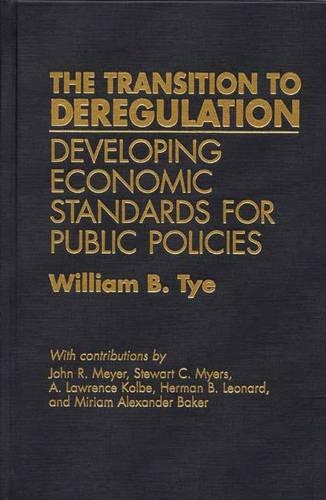
The Transition to Deregulation: Developing Economic Standards for Public Policies
(Hardback)
Publishing Details
The Transition to Deregulation: Developing Economic Standards for Public Policies
By (Author) William Tye
Bloomsbury Publishing PLC
Praeger Publishers Inc
30th May 1991
United States
Classifications
Tertiary Education
Non Fiction
385.1
Physical Properties
Hardback
576
Description
William Tye draws on his large body of work in the area of railroad deregulation to address specific economic problems associated with deregulation. He elucidates principles that can be applied to any major industry entering the competitive marketplace - particularly telecommunications and other utilities, including gas and electric. Tye has updated and revised his previous articles and structured them into an integrated framework. Each section addresses a major issue and can be read on a stand-along basis. By providing appropriate economic models and rules for successful transition, this work is designed to encourage a smooth changeover to deregulation. It is important, Tye says, to recognize that the original problems regulation sought to solve do not simply go away, and that new problems can be created by the transition itself. He stresses the need to deal with legacies from the regulated past, such as investments, policies, labour contracts, and sunk investment costs by buyers. He explains why explicit regulatory intervention may be required to correct equity and efficiency imbalances. Sections cover topics such as finance and revenue adequacy, pricing, mergers, and competitive access and will serve as a valuable resource for attorneys, regulatory commission staff, academics and consultants.
Reviews
A number of important industries in the US have recently been shifted from regulation by government commission toward regulation by the market; they include telecommunications, air travel, and trucking. Tye (consultant with the Brattle Group) has collected his articles (some with coauthors) on the economic principles of regulation, deregulation, and the process and problems of deregulation (with modification and integration), illustrating them with reference to railroads. The topics involve the substantive and continuing problems associated with regulated industries and also present in the transition to deregulation: revenue adequacy, rate of return, inflation, pricing (with particular attention to the benefits and problems associated with Ramsey pricing), mergers, and competitive access, among others. The intended audience is "consultants, attorneys, regulators, business people, customers, investors, and academics"; each can gain significantly from this volume, but some important points will be lost without substantive economics training (e.g., a workable undergraduate major). Very good bibliography and index. Upper-division and graduate collections.-Choice
"A number of important industries in the US have recently been shifted from regulation by government commission toward regulation by the market; they include telecommunications, air travel, and trucking. Tye (consultant with the Brattle Group) has collected his articles (some with coauthors) on the economic principles of regulation, deregulation, and the process and problems of deregulation (with modification and integration), illustrating them with reference to railroads. The topics involve the substantive and continuing problems associated with regulated industries and also present in the transition to deregulation: revenue adequacy, rate of return, inflation, pricing (with particular attention to the benefits and problems associated with Ramsey pricing), mergers, and competitive access, among others. The intended audience is "consultants, attorneys, regulators, business people, customers, investors, and academics"; each can gain significantly from this volume, but some important points will be lost without substantive economics training (e.g., a workable undergraduate major). Very good bibliography and index. Upper-division and graduate collections."-Choice
Author Bio
WILLIAM B. TYE is a principal of The Brattle Group in Cambridge, Massachusetts. He has published numerous works on the transition to deregulation.
